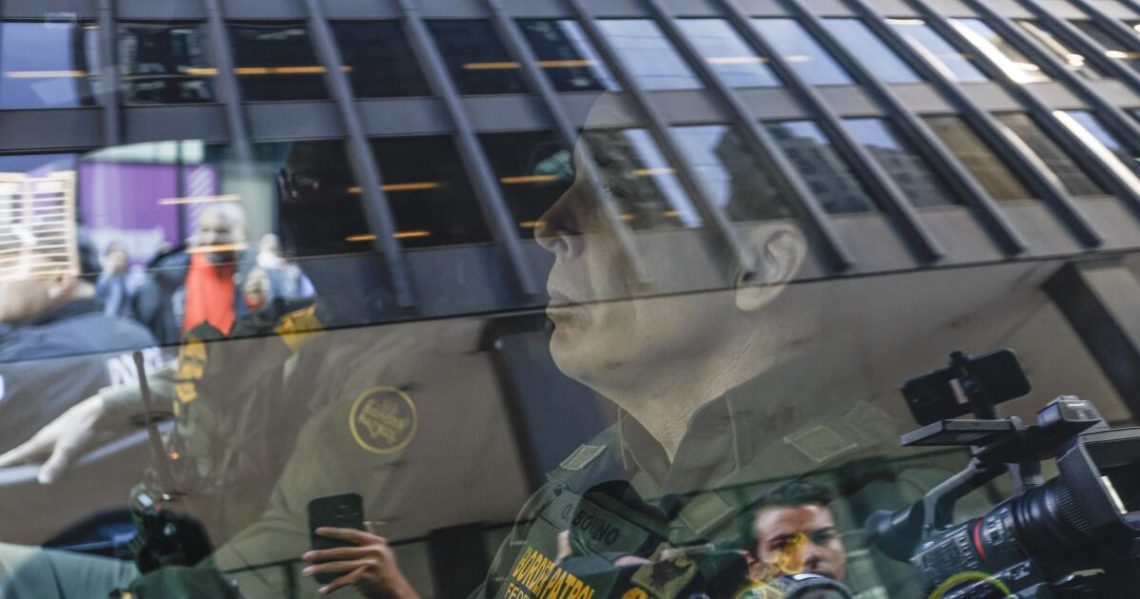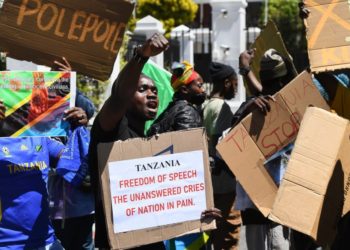Ever since the Trump immigration raids began in Los Angeles in June, local leaders and community activists have criticized agents for sometimes making it difficult to identify them as federal law enforcement officials or refusing to identify themselves at all.
Now, an unexpected new group has expressed its own concerns: the FBI.
Citing a string of incidents in which masked criminals posing as immigration officers robbed and kidnapped victims, the FBI recently issued a memo suggesting agents clearly identify themselves while they’re in the field.
The FBI explained its reasoning in a three-page document sent to police agencies across the country last month.
In the memo, the FBI says criminals impersonating law enforcement “damages trust” between them and the community and that law enforcement has an “opportunity” to better coordinate with their local, state and federal partners, carry out informational campaigns to educate the public about impostors and for agents to show their identification when asked while out in the field.
Undocumented immigrants and U.S. citizens have been detained by masked people on city streets, in hospitals, courthouses, and outside schools and places of worship over the last several months. California has banned the use of masks among law enforcement agencies, but on Tuesday a cadre of masked agents gathered in an offsite Dodger Stadium parking lot while carrying out more raids.
The FBI’s memo, obtained through a records request by the national security transparency nonprofit Property of the People, was prepared by the New York field office and first reported by Wired magazine. It details several instances where people impersonated immigration agents.
In Florida, a man pretending to be an ICE agent kidnapped a woman who was in the process of becoming a U.S. citizen. The suspect approached the woman on April 21, claimed he was there to pick her up and showed her his shirt that read ICE, the FBI said. The woman got in the suspect’s car and he drove her to an apartment complex, but she was able to escape.
In August, three men in black clothing and wearing vests robbed a New York restaurant and stole from their ATM. The suspects also beat the employees and tied them up. One of the employees willingly surrendered to the suspects when they heard them identify themselves as immigration agents, the FBI said.
The FBI also pointed to an April social media post where a man wearing a black jacket with an ICE patch stood outside a hardware store to intimidate day laborers. An image circulating on social media matching the description of the incident showed the man also wearing a red Trump hat.
“I don’t know if there is federal law that requires a standard police uniform,” David Levine, a professor of law at UC San Francisco said. “It’s good practice to have a distinguishing uniform. Because when you have federal agents dressing as ruffians, with scarves over their faces and glasses in a paramilitary fashion, then it’s so much easier for people to impersonate them.”
The FBI’s national press office did not respond to requests for comment, citing the government shutdown in an automated email response.
The FBI’s memo arrives several months after masked agents descended on Los Angeles and other cities across the country at the behest of the Trump White House. Multiple undocumented immigrants have died while trying to run away from masked agents during immigration raids, while others have been shot at while in their vehicles and many more have been beaten by masked agents who did not immediately identify themselves.
Levine says it’s a person’s constitutional right under the 4th Amendment to ask a masked, federal agent to identify themselves.
“It takes a cool head under a tense moment to ask someone, ‘What’s your name? I can’t see your badge? Can you identify yourself?’” Levine said. “It’s practically impossible to ask all of that when you’re being thrown to the ground. But you do have the right to ask.”
There are plenty of examples of people allegedly impersonating law enforcement in California in recent years.
In April 2018, Luis Flores-Mendoza of Santa Ana was sentenced to eight years in prison for posing as a federal immigration officer in an attempt to extort $5,000 from a woman, who reported him to the police. The following month, Matthew Ryan Johnston of Fontana was sentenced to two years in federal prison for impersonating an ICE agent. In 2023 and 2024, police in Southern California announced arrests in two separate cases where men were accused of impersonating police to conduct traffic stops.
But state officials have sounded the alarm because of the Trump administration’s approach.
Earlier this year, following federal immigration raids in the Central Valley, two Fresno men were accused of posing as federal immigration agents and filming themselves harassing local businesses. The Fresno Police Department said the two men wore wigs and black tactical vests with letters deliberately covered up so they read “Police” and “ICE,” and confronting people at nearly a dozen businesses. The department said the men appeared to have done it for social media and declined to release their names.
The following month, Atty. Gen. Rob Bonta issued a warning to Californians about the rise of ICE impersonators and scammers looking to take “advantage of the fear and uncertainty created by Trump’s mass deportation policies. “
“Let me be clear: If you seek to scam or otherwise take advantage of California’s immigrant communities, you will be held accountable,” Bonta said.
In June, two additional local cases popped up that weren’t included on the FBI memo.
In one, Huntington Park police arrested a man who they suspected of posing as a Border Patrol agent. Police said the man possessed an unlicensed handgun and copies of U.S. Homeland Security removal notices and a list of radio codes for U.S. Customs and Border Protection.
In the other, police in Los Angeles County arrested a man driving a decommissioned police cruiser with control lights and a siren who allegedly had cocaine, a forged Homeland Security investigator’s badge and a pellet gun in his car.
In a statement, Property of the People Executive Director Ryan Shapiro said, “It’s rich the FBI thinks ICE has a PR problem in immigrant communities because of impersonators, while masked and militarized ICE agents are waging a daily campaign of terror against those very communities.”
The Department of Homeland Security and Immigration and Customs Enforcement did not respond to requests for comment.
In a statement to The Times, the office of Mayor Karen Bass said it’s unacceptable for law enforcement officers to operate without properly identifying themselves.
“The Mayor has been supportive of state legislation that would require immigration officers to identify themselves as well as make it a crime for law enforcement officers to wear a face covering while performing their duties, except for specific circumstances such as protection from hazardous smoke.”
Los Angeles Councilmember Eunisses Hernandez, whose district includes MacArthur Park, Cypress Park and Pico Union, said the FBI’s memo simply confirms what locals have known all along, even as they manufacture “confusion, fear, chaos and real danger.”
“Now even the FBI, under an administration that has aggressively expanded unconstitutional immigration enforcement, has confirmed that when agents don’t clearly identify themselves, it opens the door for violent impersonators to prey on vulnerable families,” Hernandez said in a statement. “That’s exactly why I co-authored the council motion requiring the LAPD to verify the identity of anyone claiming to be a law enforcement officer, and to strengthen penalties for impersonating an officer. When even Trump’s FBI is warning that unidentified agents put us at risk, it’s a clear sign that this problem can’t be ignored any longer.”
Still, not everyone thinks agents will heed the FBI’s advice. Even if agents were to begin identifying themselves during sweeps, the distrust created from this summer’s sweeps will stay with community members for some time, advocates say.
“I don’t expect them to all of a sudden start walking around with no mask or start walking around and identifying themselves,” said Leo Martinez of VC Defensa, a coalition of local groups dedicated to protecting the immigrant and refugee populations of Ventura County. “More than anything, I think it’s a way for the FBI to put a little bit of distance between themselves and the ICE agents in the public relations sphere, but not really on the ground.”
The post FBI urges ICE agents to identify themselves after string of impersonators commit crimes appeared first on Los Angeles Times.




